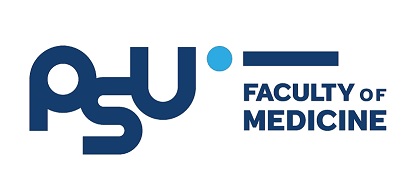Publication Ethics
PSU Medical Journal: Ethical Conduct Guidelines
The PSU Medical Journal observes a high standard of publication ethics. All research involving human subjects (either direct experiments or use of medical/personal data or opinion), including research that use a questionnaire and classroom researches. The corresponding author must declare that all contributing authors were qualified to perform human subject studies and the study was approved by the Human Research Ethics Committee of the involved institute/hospital. A statement on ethical clearance should be placed in the Methods section. Related documents should be available upon request.
Works involving animals must be approved by the appropriate Institutional Board on Animal Research. Studies involving the use of bacteria (live or killed) and/or plasmids must comply with the Thailand Pathogens and Animal Toxins Act 2015 (พระราชบัญญัติเชื้อโรคและพิษจากสัตว์ พ.ศ. ๒๕๕๘) (https://www.tm.mahidol.ac.th/research/Biosafety/PathogensAndToxinsACT_EN.pdf). Laboratory work should be performed following the Enhancement of Safety Practice of Research Laboratory in Thailand (ESPReL) accredited laboratory (http://esprel.labsafety.nrct.go.th).
1. Editors' Ethics
1.1. Responsibility and Accountability
Editors are responsible for deciding which submitted articles should be published, guided by the journal's policies and the legal requirements regarding libel, copyright infringement, and plagiarism. Manuscripts should be evaluated for their intellectual content without regard to race, gender, sexual orientation, religious belief, ethnic origin, citizenship, or political philosophy of the authors. Editors and editorial staff must not disclose any information about a submitted manuscript to anyone other than the corresponding author, reviewers, potential reviewers, other editorial advisers, and the publisher, as appropriate.
1.2. Editorial Integrity
- Conflict of Interest: Editors should not use unpublished information disclosed in a submitted manuscript for their own research purposes without the author's explicit written consent.
- Publication Decisions: Editors should be transparent about the processes involved in editorial decision-making, including criteria for acceptance, review processes, and the role of the editorial board.
1.3. Engagement and Communication
- Peer Review: Editors should ensure that the peer review process is fair, unbiased, and timely. Reviewers should be chosen based on their expertise and ability to provide high-quality and constructive feedback.
- Correction and Retraction: When errors are found in published articles, editors should facilitate the publication of corrections, clarifications, retractions, or apologies as appropriate.
2. Reviewers' Ethics
2.1. Contribution to Editorial Decisions
- Objective Review: Reviewers should provide objective, constructive, and detailed feedback to help authors improve their work and editors to make informed decisions.
- Timeliness: Reviewers should complete their reviews within the specified timeframe to ensure timely processing of manuscripts.
2.2. Confidentiality and Integrity
- Confidentiality: Manuscripts received for review must be treated as confidential documents. They must not be shared or discussed with others except as authorized by the editor.
- Conflict of Interest: Reviewers should declare any potential conflicts of interest that might bias their opinions and recuse themselves from reviewing manuscripts where appropriate.
2.3. Ethical Considerations
- Acknowledgment of Sources: Reviewers should identify relevant published work that has not been cited by the authors. Any statement that an observation, derivation, or argument had been previously reported should be accompanied by the relevant citation.
- Respect for Authors: Reviewers should avoid personal criticism of the author and focus on providing constructive feedback.
3. Authors' Ethics
3.1. Reporting Standards
- Accuracy and Transparency: Authors should present an accurate account of the work performed and an objective discussion of its significance. Underlying data should be accurately represented in the paper.
- Originality and Plagiarism: Authors must ensure that they have written entirely original works and that they have appropriately cited or quoted the work and/or words of others.
3.2. Data Access and Retention
- Data Availability: Authors should be prepared to provide public access to the data underlying their findings and should retain such data for a reasonable time after publication.
- Ethical Approval: Authors should provide evidence of ethical approval for research involving human or animal subjects.
3.3. Disclosure and Conflicts of Interest
- Financial Disclosure: All sources of financial support for the project should be disclosed. Authors should also disclose any potential conflicts of interest.
- Authorship and Contribution: All individuals who have made significant contributions should be listed as co-authors. The corresponding author should ensure that all co-authors have approved the final version of the paper and have agreed to its submission for publication.
3.4. Ethical Compliance
- Acknowledgment of Sources: Proper acknowledgment of the work of others must always be given. Authors should cite publications that have influenced the nature of the reported work.
- Errors in Published Works: When an author discovers a significant error or inaccuracy in their published work, it is their obligation to promptly notify the journal editor or publisher and cooperate with the editor to retract or correct the paper.







